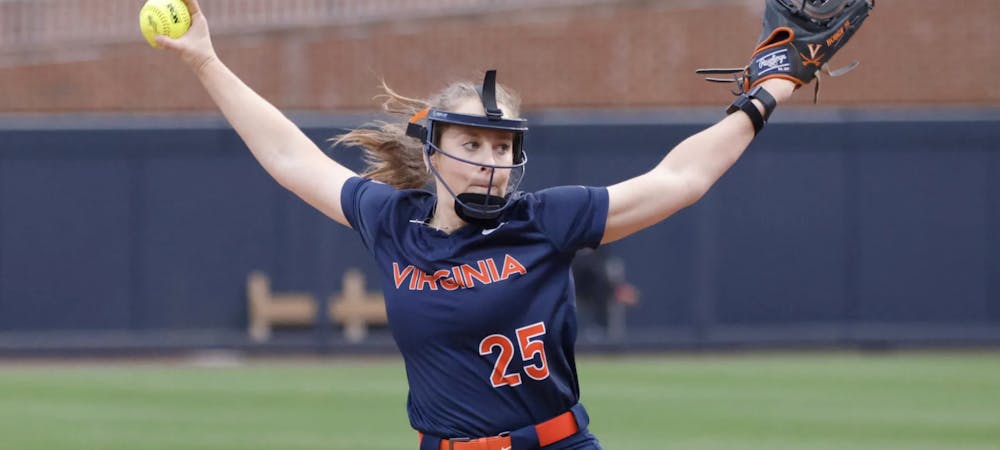Tuesday night, Virginia lost to Liberty at Palmer Park. Senior pitcher Mikayla Houge threw a complete game, seven full innings of one-run ball, allowing just two hits and one walk. For the Flames, freshman pitcher Katie Love also threw a complete game but allowed six hits. The difference in the game was a single in the fifth inning, followed up by a stolen base and two consecutive groundouts to score the Liberty runner. Despite allowing no extra base hits and issuing just one free pass, Houge notched a loss for Tuesday’s performance, a continuation of a troubling trend — the offense struggles to match the success of the pitching staff, leading to low-scoring losses and missed opportunities.
Houge is one of several Cavaliers to find success in the circle in 2024. Sophomore pitcher Eden Bigham pitched to the tune of a 2.52 earned run average in 111 innings in 2023, and she has picked up right where she left off — Bigham holds a 2.20 ERA through 95.1 innings thus far, earning ACC Player of the Week Honors in late February.
Senior pitcher Madison Harris is yet another reliable arm for Virginia — despite pitching relatively little during her first three seasons in Charlottesville, Harris currently holds an unthinkable 1.31 ERA through 48.0 innings of work. Like Bigham, Harris also earned ACC Player of the Week Honors thanks to a fantastic week of work in late March.
The strength of the Cavaliers’ pitching staff is obvious when compared to the rest of the conference. Virginia is in the top five in the ACC in ERA, earned runs allowed, walks allowed and opponent’s batting average. Bigham and Harris both place in the top 10 in ERA and opponent’s batting average amongst individual pitchers.
The pitching staff is the main reason why the Cavaliers find themselves sitting fifth in the ACC and making their first appearance in the Softball America national rankings since 1995. Out of six pitchers with appearances for Virginia in 2024, five hold ERAs below 3.00. Bigham, Harris, Houge and senior pitcher Savanah Henley have held opposing hitters to a combined batting average of .192 and account for 211.2 of 258.0 innings pitched by the Cavaliers.
It is abundantly clear that the Cavaliers’ pitching staff grades out excellently. So how does Bigham have six losses to her name? Why does Virginia sit in fifth place in the ACC, rather than among the major contenders for a conference title? The answer lies in the offense, which consistently fails to match the excellence of the pitching staff. Three of Bigham’s six losses have come in outings where she has allowed three or fewer earned runs. However, in those six losses, the Cavaliers scored one or no runs five times and scored two runs in the remaining game. On a more general scale, Virginia has scored two or fewer runs in 11 of its 12 losses — the outlier, a loss to Notre Dame April 6, saw the Cavaliers score just three runs.
When compared statistically to the rest of the conference, Virginia’s offense is mediocre at best. The Cavaliers rank well within the bottom half of the ACC in batting average, runs, on-base percentage, hits and total bases. The lineup also lacks power, as out of 13 ACC teams, Virginia ranks 11th in home runs and 12th in slugging percentage, which are key indicators of a team’s ability to drive the ball and do damage. Individually, the Cavaliers have just one player in the ACC’s top 30 in batting average — sophomore infielder Jade Hylton.
Regardless of what the Softball America rankings may say, those statistics are not characteristic of a top-25 team, but they do match Virginia softball teams of years past. In 2023, the Cavaliers staggered to an 8-16 record in conference play and an eighth-place finish in the ACC despite strong pitching metrics that included a fourth-place finish in ERA with a .242 opponent’s batting average. The offensive metrics were much more indicative of an eighth-place team — 10th in batting average and hits, ninth in runs scored and on-base percentage. Dominant pitching and tepid offense are Virginia softball traditions, ones that the 2024 squad continues to perpetuate.
The Cavaliers appear well on their way to another 30-win season and a top-five finish in the ACC. After making the All-ACC Third Team in 2023, Bigham is primed for another All-ACC honor in 2024, along with other high-flying members of the Virginia pitching staff. Still, with 11 games remaining in regular season play, the Cavaliers must make adjustments at the plate. Five of those 11 games are against Duke and Virginia Tech, two of the top three teams in the ACC. Duke has the best pitching in the conference by nearly every metric, and Virginia will travel to Durham, N.C. for a three-game series starting April 19. The Cavaliers can ill afford to waste strong pitching performances against the Blue Devils, who are ranked No. 1 in the country by Softball America and currently hold the top spot in the ACC.
The offense’s failure to consistently provide solid run support to its pitchers could prove to be a fatal flaw, especially in competitive tournament play, when teams are more inclined to send out star pitchers on little rest. As the Virginia pitchers continue to lock down opposing offenses, the batting lineup must pick up the slack and give the pitchers some breathing room as the final stretch rapidly approaches. With an improved offense and the usual suspects continually putting together dominant outings, there’s nothing standing between the Cavaliers and a major ACC Tournament run.







